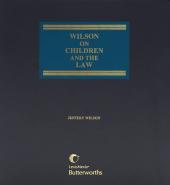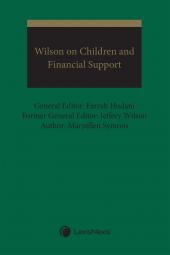Wilson on Children and the Courtroom
One Year Subscription Only Terms
Subscribers receive the product(s) listed on the Order Form and any Updates made available during the annual subscription period. Shipping and handling fees are not included in the annual price.
Subscribers are advised of the number of Updates that were made to the particular publication the prior year. The number of Updates may vary due to developments in the law and other publishing issues, but subscribers may use this as a rough estimate of future shipments. Subscribers may call Customer Support at 800-833-9844 for additional information.
Subscribers may cancel this subscription by: calling Customer Support at 800-833-9844; emailing customer.support@lexisnexis.com; or returning the invoice marked 'CANCEL'.
If subscribers cancel within 30 days after the product is ordered or received and return the product at their expense, then they will receive a full credit of the price for the annual subscription.
If subscribers cancel between 31 and 60 days after the invoice date and return the product at their expense, then they will receive a 5/6th credit of the price for the annual subscription. No credit will be given for cancellations more than 60 days after the invoice date. To receive any credit, subscriber must return all product(s) shipped during the year at their expense within the applicable cancellation period listed above.
Product description
"Wilson on Children and the Courtroom is a handy resource for lawyers who practice criminal or family law, represent young offenders in the criminal justice system, or represent children in other proceedings. I recommended this book for courthouse and law society libraries."
Reviewed by Lori O'Connor, Public Prosecutions
Melfort, SK
See Review in 2022 Canadian Law Library Review 47:2 (pages 28-29)
General Editor: Farrah Hudani
Former General Editor: Jeffery Wilson
Author: John P. Schuman
Anyone seeking a comprehensive overview of the role of children in the family law courtroom – as well as their rights – would do well to turn to Wilson on Children and the Courtroom for guidance. The content in this newly published manual is drawn from the industry-leading loose-leaf text Wilson on Children and the Law, but focuses exclusively on children in the courtroom and offers an expert analysis of that specific area of family law.
Topics covered include:
- Litigation guardians
- Hearing from the child as a non-witness, non-party and witness
- The judge’s interview of the child
- Assessing the competency of the child witness
- Corroboration
- Hearsay
- Accommodation of the child witness in court
- The rights of the child witness
Wilson on Children and the Courtroom offers an affordable, accessible alternative to anyone who must deal with children in the courtroom in the family law context and would be an invaluable acquisition for family law lawyers in Ontario, judges, legal aid clinics and law libraries.
Table of contents
Chapter 1: Introduction
Chapter 2: Party status
a) General
b) The litigation guardian
c) Assessing the litigation guardian assumptions
Chapter 3: Hearing from the child as a non-witness and non-party
a) The theory behind hearing the child without the child testifying
b) The judge’s interview
c) Through the evidence of a professional
Chapter 4: Hearing from the child as a witness
a) Hearing from the child as a witness rather than through other means
b) The competency of the child witness
c) Corroboration
d) The hearsay rule and its applicability to the statements of children
e) Accommodation of the child witness in the court system
Chapter 5: Rights of the child witness
a) Privacy
b) Private and confidential hearing
c) Support persons
Chapter 6: “Hearing” the child through a legal representative
a) Divergent roles in Canada
b) Case law on the duties and role of the child’s legal representative in child protection and custody/access disputes
c) The child’s counsel: Disagreement in case law
d) Legal representation and the child’s “best interests”
Chapter 7: Contempt of court
a) The Youth Criminal Justice Act
b) As a non-party in custody litigation
 Lexis Nexis
Lexis Nexis 


